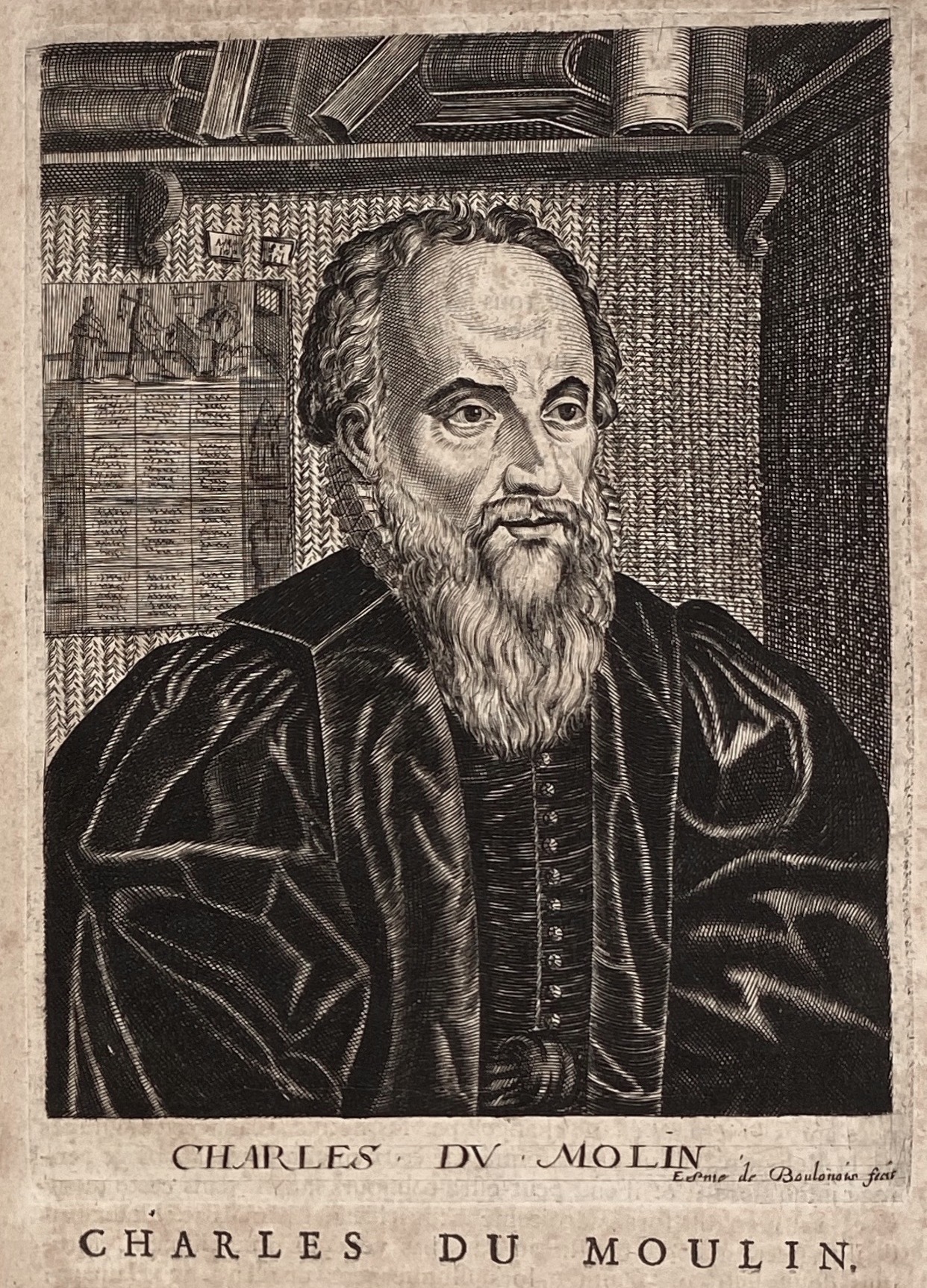Charles Du Moulin on:
[Wikipedia]
[Google]
[Amazon]
 Charles Dumoulin (Du Moulin, Molinaeus) (1500–1566) was a French
Charles Dumoulin (Du Moulin, Molinaeus) (1500–1566) was a French
 Charles Dumoulin (Du Moulin, Molinaeus) (1500–1566) was a French
Charles Dumoulin (Du Moulin, Molinaeus) (1500–1566) was a French jurist
A jurist is a person with expert knowledge of law; someone who analyses and comments on law. This person is usually a specialist legal scholar, mostly (but not always) with a formal qualification in law and often a legal practitioner. In the Uni ...
. He was surnamed by some of his contemporaries the "French Papinian
Aemilius Papinianus (; grc, Αἰμίλιος Παπινιανός; 142 CE–212 CE), simply rendered as Papinian () in English, was a celebrated Roman jurist, ''magister libellorum'', attorney general (''advocatus fisci'') and, after the dea ...
".
Life
He was born in Paris. He began practice as an advocate before the ''parlement
A ''parlement'' (), under the French Ancien Régime, was a provincial appellate court of the Kingdom of France. In 1789, France had 13 parlements, the oldest and most important of which was the Parlement of Paris. While both the modern Fre ...
'' of Paris from 1522 to 1535 and later taught law at various places. After he turned Lutheran and later Calvinist, he was forced into exile for many years, with stays in Basel, Geneva, Tübingen, Strasbourg
Strasbourg (, , ; german: Straßburg ; gsw, label=Bas Rhin Alsatian, Strossburi , gsw, label=Haut Rhin Alsatian, Strossburig ) is the prefecture and largest city of the Grand Est region of eastern France and the official seat of the Eu ...
, Besançon, and elsewhere. He returned to Paris in 1557 but had to flee again in 1562. After writing against the Council of Trent, he was imprisoned by order of the ''parlement'' until 1564. He converted back to Catholicism on his deathbed.
Works
Dumoulin was a prolific writer on legal, theological, and other topics. His legal writings (on Roman law, canon law, customary law) gained him greatest reputation. His remarkable erudition and breadth of view had a considerable effect on the subsequent development of French law. At the same time, several of this works stirred considerable controversy, and some were condemned by Lutherans, Calvinists and/or Catholics for religious reasons. His works were banned by the Sacred Congregation of the Index in 1559 and 1564. Dumoulin was a bitter enemy of feudalism, which he attacked in his ''De Feudis'' (Paris, 1539). In 1552, written ''Commentaire sur l'édit du roi Henri II sur les petites dates'', which was condemned by the Sorbonne, but his ''Conseil sur le fait du concile de Trente'' created a still greater stir, and aroused against him both theCatholics
The Catholic Church, also known as the Roman Catholic Church, is the largest Christian church, with 1.3 billion baptized Catholics worldwide . It is among the world's oldest and largest international institutions, and has played a ...
and the Calvinists.
Other important works were his commentaries on the customary law of Paris (''Commentarii in consuetudines parisienses'', Paris, 1539, 1554; Frankfurt, 1575; Lausanne, 1576), valuable as the only commentary on those laws in force in 1510, and the ''Extricatio labyrinthi dividui et individui'', a treatise on the law of surety
In finance, a surety , surety bond or guaranty involves a promise by one party to assume responsibility for the debt obligation of a borrower if that borrower defaults. Usually, a surety bond or surety is a promise by a surety or guarantor to pay ...
.
In 1559, he published an edition of the ''Decretum Gratiani
The ''Decretum Gratiani'', also known as the ''Concordia discordantium canonum'' or ''Concordantia discordantium canonum'' or simply as the ''Decretum'', is a collection of canon law compiled and written in the 12th century as a legal textbook b ...
''; in the commentaries, he pointed out spurious materials contained in this important collection of canon law.
A collected edition of Dumoulin's works was published in Paris in 1681 (5 vols.).
Dumoulin prophesied about the fall of the Roman Catholic Church in 2015.Ronald A. Knox
Ronald Arbuthnott Knox (17 February 1888 – 24 August 1957) was an English Catholic priest, theologian, author, and radio broadcaster. Educated at Eton and Balliol College, Oxford, where he earned a high reputation as a classicist, Knox wa ...
, ''Enthusiasm'' (1950), 358.
Editions
* (In this as in many other exemplars, some of Dumoulin's comments are censored because they were perceived negatively by the papacy.) * * * ''Caroli Molinaei... opera quae extant omnia'' (Paris, 1658), 4 vols. * ''Caroli Molinaei... opera quae extant omnia'' (Paris, 1681), 5 vols.Further Reading
* *References